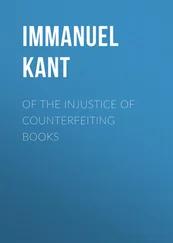And now we shall proceed to point out the extensive utility and influence of this postulate of possibility. When I represent to myself a thing that is permanent, so that everything in it which changes belongs merely to its state or condition, from such a conception alone I never can cognize that such a thing is possible. Or, if I represent to myself something which is so constituted that, when it is posited, something else follows always and infallibly, my thought contains no self-contradiction; but whether such a property as causality is to be found in any possible thing, my thought alone affords no means of judging. Finally, I can represent to myself different things (substances) which are so constituted that the state or condition of one causes a change in the state of the other, and reciprocally; but whether such a relation is a property of things cannot be perceived from these conceptions, which contain a merely arbitrary synthesis. Only from the fact, therefore, that these conceptions express a priori the relations of perceptions in every experience, do we know that they possess objective reality, that is, transcendental truth; and that independent of experience, though not independent of all relation to form of an experience in general and its synthetical unity, in which alone objects can be empirically cognized.
But when we fashion to ourselves new conceptions of substances, forces, action, and reaction, from the material presented to us by perception, without following the example of experience in their connection, we create mere chimeras, of the possibility of which we cannot discover any criterion, because we have not taken experience for our instructress, though we have borrowed the conceptions from her. Such fictitious conceptions derive their character of possibility not, like the categories, a priori , as conceptions on which all experience depends, but only, a posteriori , as conceptions given by means of experience itself, and their possibility must either be cognized a posteriori and empirically, or it cannot be cognized at all. A substance which is permanently present in space, yet without filling it (like that tertium quid between matter and the thinking subject which some have tried to introduce into metaphysics), or a peculiar fundamental power of the mind of intuiting the future by anticipation (instead of merely inferring from past and present events), or, finally, a power of the mind to place itself in community of thought with other men, however distant they may be — these are conceptions the possibility of which has no ground to rest upon. For they are not based upon experience and its known laws; and, without experience, they are a merely arbitrary conjunction of thoughts, which, though containing no internal contradiction, has no claim to objective reality, neither, consequently, to the possibility of such an object as is thought in these conceptions. As far as concerns reality, it is self-evident that we cannot cogitate such a possibility in concreto without the aid of experience; because reality is concerned only with sensation, as the matter of experience, and not with the form of thought, with which we can no doubt indulge in shaping fancies.
But I pass by everything which derives its possibility from reality in experience, and I purpose treating here merely of the possibility of things by means of a priori conceptions. I maintain, then, that the possibility of things is not derived from such conceptions per se, but only when considered as formal and objective conditions of an experience in general.
It seems, indeed, as if the possibility of a triangle could be cognized from the conception of it alone (which is certainly independent of experience); for we can certainly give to the conception a corresponding object completely a priori, that is to say, we can construct it. But as a triangle is only the form of an object, it must remain a mere product of the imagination, and the possibility of the existence of an object corresponding to it must remain doubtful, unless we can discover some other ground, unless we know that the figure can be cogitated under the conditions upon which all objects of experience rest. Now, the facts that space is a formal condition a priori of external experience, that the formative synthesis, by which we construct a triangle in imagination, is the very same as that we employ in the apprehension of a phenomenon for the purpose of making an empirical conception of it, are what alone connect the notion of the possibility of such a thing, with the conception of it. In the same manner, the possibility of continuous quantities, indeed of quantities in general, for the conceptions of them are without exception synthetical, is never evident from the conceptions in themselves, but only when they are considered as the formal conditions of the determination of objects in experience. And where, indeed, should we look for objects to correspond to our conceptions, if not in experience, by which alone objects are presented to us? It is, however, true that without antecedent experience we can cognize and characterize the possibility of things, relatively to the formal conditions, under which something is determined in experience as an object, consequently, completely a priori . But still this is possible only in relation to experience and within its limits.
The postulate concerning the cognition of the reality of things requires perception, consequently conscious sensation, not indeed immediately, that is, of the object itself, whose existence is to be cognized, but still that the object have some connection with a real perception, in accordance with the analogies of experience, which exhibit all kinds of real connection in experience.
From the mere conception of a thing it is impossible to conclude its existence. For, let the conception be ever so complete, and containing a statement of all the determinations of the thing, the existence of it has nothing to do with all this, but only with the question whether such a thing is given, so that the perception of it can in every case precede the conception. For the fact that the conception of it precedes the perception, merely indicates the possibility of its existence; it is perception which presents matter to the conception, that is the sole criterion of reality. Prior to the perception of the thing, however, and therefore comparatively a priori , we are able to cognize its existence, provided it stands in connection with some perceptions according to the principles of the empirical conjunction of these, that is, in conformity with the analogies of perception. For, in this case, the existence of the supposed thing is connected with our perception in a possible experience, and we are able, with the guidance of these analogies, to reason in the series of possible perceptions from a thing which we do really perceive to the thing we do not perceive. Thus, we cognize the existence of a magnetic matter penetrating all bodies from the perception of the attraction of the steel-filings by the magnet, although the constitution of our organs renders an immediate perception of this matter impossible for us. For, according to the laws of sensibility and the connected context of our perceptions, we should in an experience come also on an immediate empirical intuition of this matter, if our senses were more acute — but this obtuseness has no influence upon and cannot alter the form of possible experience in general. Our knowledge of the existence of things reaches as far as our perceptions, and what may be inferred from them according to empirical laws, extend. If we do not set out from experience, or do not proceed according to the laws of the empirical connection of phenomena, our pretensions to discover the existence of a thing which we do not immediately perceive are vain. Idealism, however, brings forward powerful objections to these rules for proving existence mediately. This is, therefore, the proper place for its refutation.
Читать дальше












